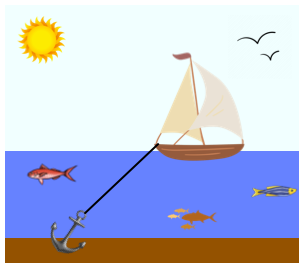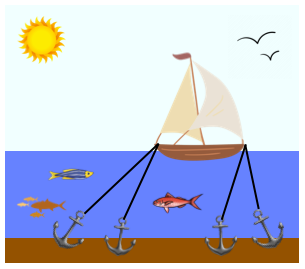
Imagine that people are sailboats and that religions are harbors. In the image to the right we see person A safely and firmly within a harbor. Person B is thinking about exploring that harbor, that religion. Person C is just leaving their former religion. Person D is not interested in any religion and just sailing off to enjoy other islands and the open sea where staying anchored is not required.
The next picture below shows a sailboat in a harbor, or in this analogy, a person after they’ve first entered a religion. To stay put in that religion, the person has to put down an anchor — something to help from being carried back out to sea by wind or tides (the influences of others or circumstances). A few examples of initial anchors could be:

- Loved Ones: a loved one is already in the religion and you will form a tighter bond with them by also joining.
- Belonging: an accepting, caring group for a person who does not find that in their own present group, or society.
- Values: a group with values that match the person’s personal needs, ambitions, ideals or desires.
- Status: acceptance in broader society by belonging to the religion, or status within the religion because of the opportunity for leadership or uniqueness that is difficult to achieve outside of that harbor.
- Purpose & Meaning: Some find increased meaning and purpose in life by feeling like they now have the most correct and holiest ideas to present to the world. Some find purpose by serving others (the poor, nonbelievers, or the new community).
- Magic: superstitious hope for protected health, disease curing, mystical experiences or good luck in your life.
- Spackle Comfort: Answers to help you fill your doubts and gaps of knowledge about the afterlife, the meaning of life, creation and such.
- Personal Identity: Early in personal development, a sense of identity offers personal security.

This last picture to the right shows how after being in a religion for months and years, believers throw down more anchors to keep themselves even more secure within their religion. The group themselves encourages the believer to make as many of these anchors as they can so that they stay in their group. These other members do this because they want to be surrounded by other believers.
When these anchors listed above lose their grip it allows us to leave our religions. It is often a slow and sometimes painful process. Here are examples of how the same anchors above may no longer hold us among the faithful:
- Loved ones: Loved ones leave the group or betray you.
- Belonging: For some reason the group is less accepting — for instance, if they discover your son is gay, or you changed political affiliations, or your marriage has ended etc.
- Values: Your values in life change.
- Status: You lose status because others judge you as having a short-coming in your life or some skill of yours is no longer needed.
- Purpose & Meaning: You’ve found other purpose or meaning in your life.
- Magic: You become disillusioned as religious magic fails: a loved one dies of a horrible disease, you get sick, your family does not prosper.
- Spackle Comfort: You learn more about genetics, neurology, sociology, psychology, anthropology and you realize your spackle god is not as powerful as you imagined.
- Identity: Due to association with outside groups, growth of self-confidence, new skills or new relationships your need for identity with the group weakens.
These harbors can be any ideology. Religion is just one ideology but a very powerful one since it usually taps into the taboo part of the mind and into the superstitious side of mind, all the while discouraging doubt. Other forms of ideology include political parties, philosophical ideology and rigid lifestyles.
I acknowledge that like all analogies, this analogy is also far from perfect, but I thought it may be a helpful tool to understand religiosity. We tend to oversimplify why we or other people are religious or why they leave their religion, or we leave our own. Hopefully this analogy encourages more nuanced thinking.
Question for readers: Is this a helpful analogy to understand why you joined, remain in or left a religion or an ideology?








































